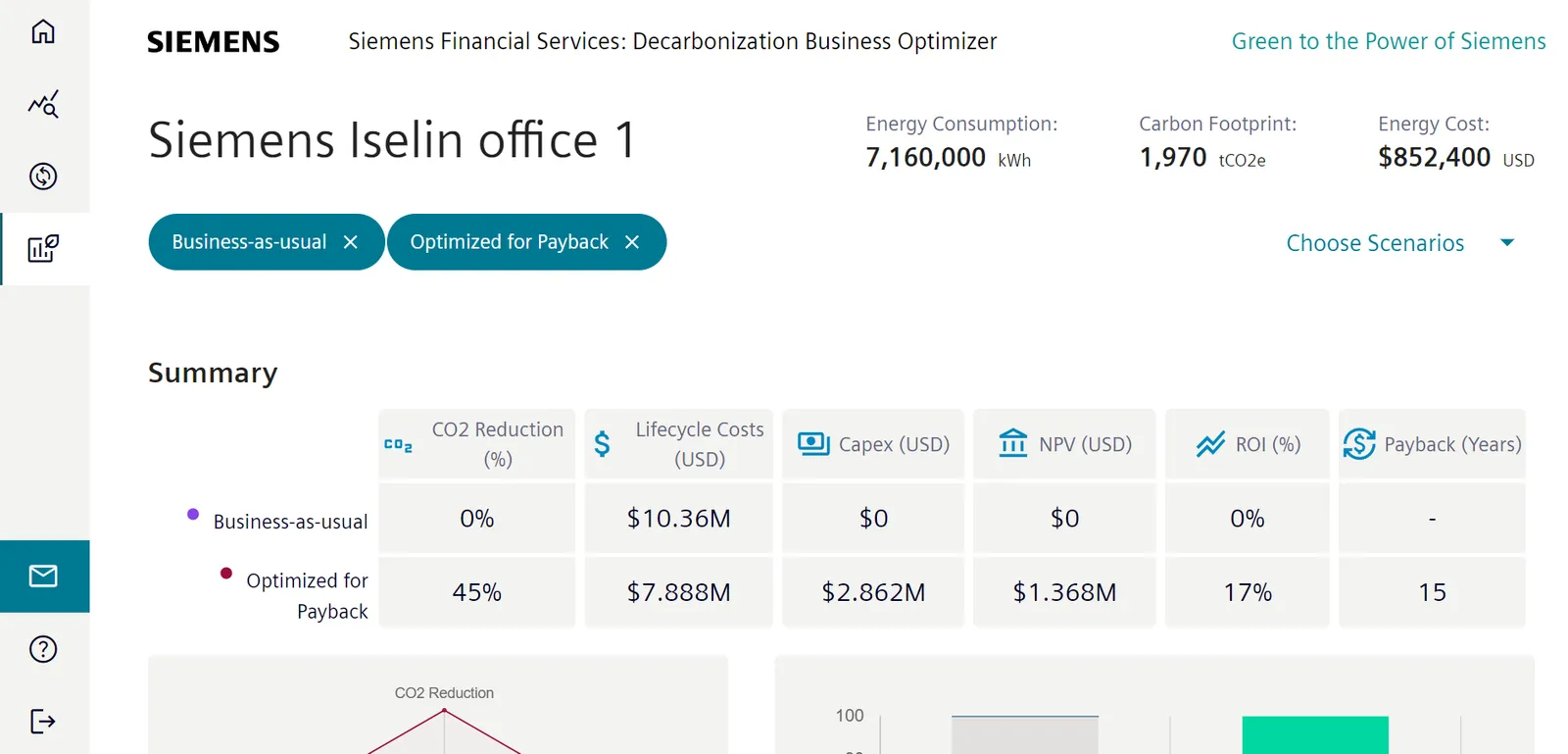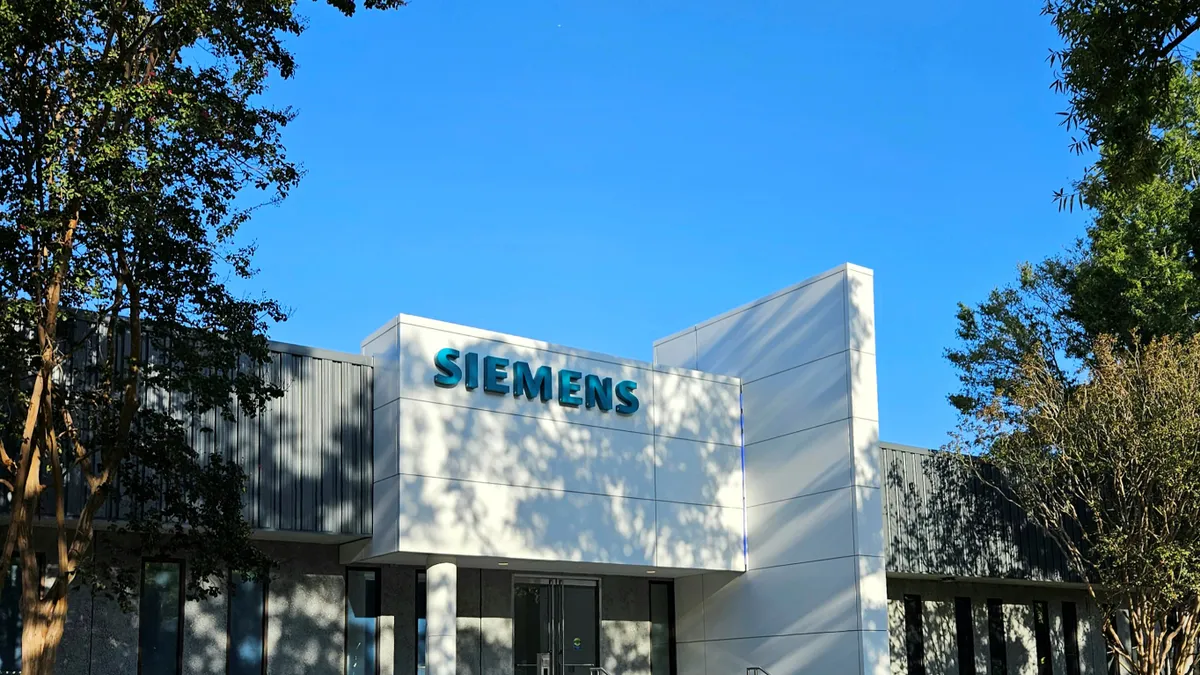Dive Brief:
- Siemens Financial Services has launched a cloud-based tool to help building owners and operators simplify their efforts to decarbonize buildings and access the financing they need to reach net-zero emissions, the company announced Sept. 24.
- The Decarbonization Business Optimizer is a free digital tool that provides baseline carbon assessments based on the location, type and size of commercial and industrial facilities, SFS said in a news release Tuesday. The DBO considers site-specific data, such as annual energy use or load profile, if available, to maximize the accuracy of its estimates and can generate decarbonization scenarios tailored to users’ preferences for specific technologies, resilience to grid outages and budget considerations, while providing a summary of estimated returns on investment, the company said.
- The DBO is envisioned as a web tool that will complement existing building management systems in use, said SFS President and CEO Anthony Casciano. “The tool is supported by nearly ten different datasets from trusted independent sources such as [the U.S. National Renewable Energy Laboratory], ComStock and the Department of Energy. We wanted the tool to be bias-free, intuitive and quick — with outputs available within less than 15 minutes,” Casciano said.
Dive Insight:
A lack of integrated data and building systems is adversely impacting operations, with 39% of commercial and real estate respondents listing carbon reduction measures as a key driver of investments in smart building technologies, according to a recent report from Johnson Controls, which commissioned Forrester Consulting for a survey of over 3,400 smart building leaders.
There is also a growing focus on in-use building performance standards and measuring emissions from individual properties, as governments and organizations move toward whole-life carbon calculations and in-use net-zero requirements, according to JLL’s 2024 Global Real Estate Transparency Index released in August. As a result, building owners and operators will need to invest in technologies that help measure and manage asset and portfolio emissions, JLL says.
"Trusted data sets coupled with credible modeling and analysis tools are vital in the complex decision-making process to achieve a clean energy future," Roderick Jackson, laboratory program manager for building technologies at NREL, said in a statement.
The DBO, developed by SFS in concert with the company’s research and development department, Siemens Technologies, utilizes advanced data analytics and cloud-based infrastructure, aggregating and leveraging data from governmental agencies such as the DOE, NREL and the U.S. Environmental Protection Agency, per the release.
The DBO can generate scenarios for facility types spanning hospitals, office buildings and manufacturing plants, per the release. The estimated carbon footprint calculated for the facility and the energy cost are based on data relevant to that facility’s geographic location, facilitating “a more accurate estimate than using country-wide averages,” SFS said.

A lack of data can sometimes deter organizations from initiating a sustainability strategy, according to Lee Evangelakos, an operations partner at American Industrial Partners who provided feedback as an initial tester of the tool. “The tool enables industrial businesses to think through the building blocks of their emission profiles and how they could begin to take action toward decarbonization,” Evangelakos said in a statement.
When operators are evaluating potential sustainability investments, they must consider quantitative metrics such as the amount of ROI forecasted for that investment along with the intended carbon reduction, Casciano said. “And qualitatively, we have to think of opportunity cost. What is the cost of doing nothing? Do you risk losing customers who are focused on reducing their scope 3 emissions?”
Since the DBO is built on the Amazon Web Services platform and utilizes “serverless architecture” to reduce its workload carbon footprint, it operates only when needed, rather than running constantly, SFS said. AWS’s infrastructure is up to 4.1 times more efficient than traditional on-premise systems, according to estimates from a recent study cited in the release. By optimizing workloads on AWS, companies can trim their associated carbon footprint by as much as 99%, SFS said.
The DBO, which can be accessed via Siemens Xcelerator, comes at the same time as Schneider Electric’s launch of a Building Decarbonization Calculator, which aims to help building owners and operators calculate their carbon emissions and energy use intensity and avoid fines for noncompliance with laws such as New York City’s Local Law 97.
While Schneider Electric plans to expand its decarbonization calculator to include other building performance standards, such as Boston’s BERDO, SFS plans to introduce a vehicle analyzer and a climate resiliency feature in the future to help companies electrify fleets and assess their sites’ ability to withstand extreme weather, the company said.












